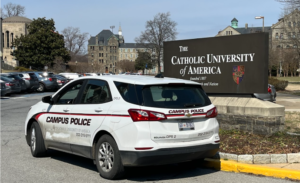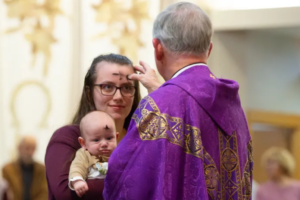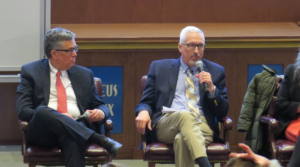SGA Rejects Reformed Treasury Bylaws, Passes Three Resolutions

Image Courtesy of The Catholic University of America
By Anna Harvey
The Catholic University of America Student Government Association hosted its eighth meeting of the 2021-22 academic year on Monday, February 7; SGA Vice President Monica Wallace presided over the meeting.
Senate Meeting 7-08 addressed a Treasury Board nominee, three resolutions, and a debate on revising Treasury bylaws.
The proceedings started with Wallace calling the room to order and reminding all about the ongoing mask mandate. After roll call, the Pledge of Allegiance, and prayer, the floor opened for public comment.
Multiple students supported Senator Matthew Michels’ Resolution 032 for amending Housing Services’ laundry services policies. Senior politics major and president of College Democrats Chloe Van Syckel voiced her opposition to the pending Treasury bylaw reforms, saying that it was not the Treasury Board’s place to allocate funds, and that the reforms may negatively affect smaller student organizations. Junior politics major and president of CUA Young Americans for Freedom Catriona Fee additionally spoke against the bylaw reforms, particularly concerning the speaker fee. Treasury Board Directors Jordan Farrell and Michael Starestinic urged senators to support reforms, in order for the student activity fee to be evenly distributed over the course of the academic year.
Chair for the Committee of Rules and Administration Senator Gerald Sharpe stated that the committee was in the process of developing numerous resolutions. Chair for the Committee for Academic Affairs Senator Maura Schlee said that the committee would continue to work on legislation concerning higher wages for Writing Center tutors, as well as legislation on website auditing. She additionally stated that the committee had a meeting concerning issues with the academic calendar. Chair for the committee on University Services Senator Jamie Besendorfer stated that the committee would work on promoting transparency on senior activities and graduation. Chair for the Committee for Student Resources Senator Garrett Farrell stated that Senator Alan Cunningham would be bringing forward a resolution on minimum wage. Chair for the Committee of Campus Life Senator Grace Birth stated that the committee discussed a potential resolution to ease the difficulties of transfer students struggling with transfer credits at Catholic University.
The proceedings then shifted to confirm the nomination of junior business major Karla Martinez-Victoria as a Treasury Board director.
The proceedings then shifted to Resolution 032, sponsored by Senator Michels and cosponsored by Senators Birth, Kyle Holcomb, Ashley Martin, and Andrea Suarez, which would update Housing Services’ laundry facilities policies. Senator Michels recounted that numerous sophomore constituents reached out to him to report that eight out of thirteen washing machines were broken in Opus Hall. Michels explained he met with Housing Services Assistant Director Joseph Duncan and was told that when a machine displays an error code, the code signifies a specific problem with the machine. In the case with the Opus washing machines, water valves needed to be replaced; however, with the current national supply chain crisis, Housing Services was delayed in fixing the problem. Michels stated that according to the current policy, students are obligated to call Caldwell and Gregory themselves or to scan a QR code to report a problem with the machines.
“I think it would make much more sense if we reported it to our RA, to Res Life, to FMO, or to Housing Services directly,” Michels said.
The floor opened to debate. Schlee asked for Michels’ reasoning behind contacting multiple University offices to report problems. Michels responded that because Residence Life houses the machines, Facilities often addresses similar problems with University appliances, and Housing Services has contact with Caldwell and Gregory, this “three-pronged” approach would be best-suited to immediately address student reports. Besendorfer then asked for the be-and-enacted clause to be amended to simply update Facilities Maintenance and Operations forms to include issues with specific washers in the drop-down menu, rather than contacting multiple offices. Michels answered that it would be easier to contact offices on the premises rather than contact an off-staff service. Sharpe clarified that further information would have to be provided to Residence Life staff.
The resolution passed with 22 in favor, 0 opposed, and 0 abstained.
The proceedings then shifted to Resolution 033, a resolution to strengthen the joint academic programs, sponsored by Schlee and cosponsored by Martin, Bowman, Farrell, Crnkovich, and Besendorfer. The resolution would require academic schools to include several initiatives within the programs: deadlines to apply for each graduate or law school programs, a series of events to give an overview of the program and to answer questions, a contract for students to sign with the appropriate dean to formally accept the student into the program, and 3+1 law programs and 4+1 ambassador programs to be appropriately advertised. Schlee explained how she witnessed the difficulties that students often experience while trying to complete the 3+1 law program or the 4+1 program, with numerous additional academic challenges. She stated that from her own experiences, there was no written agreement from her academic advisors stating that she was involved in this program.
“There was no sort of written agreement from the onset at the beginning of this junior year, where [you] could have in writing that [you] could be in this program,” Schlee said.
She additionally stated that these programs are often unused due to the severe difficulties in accomplishing them and the intense planning involved to structure classes precisely, all the while experiencing a lack of communication from departments and advisors.
Martin additionally recalled her own experiences with her academic advisors failing to specify the requirements of these programs when she initially inquired about them at the start of her freshman year.
The resolution passed with 22 yeas, 0 nays, and 0 abstentions.
The proceedings then shifted to Resolution 034, a resolution to better facilitate the move-in and out process, sponsored by Besendorfer and cosponsored by Farrell and Schlee. Besendorfer explained her prior difficulties with Housing Services, with Housing removing her rented mini-fridge over Christmas break and causing some of her belongings to be lost in the process. She stated that the move-in process was often disorganized with time slots not facilitated smoothly and not enough housing carts provided for a surplus of people arriving at one time. She clarified that she had a meeting with Housing Services, during which they were receptive of her idea of implementing a book, food, and clothing donation program at the end of the academic year. She also said that when her roommates went home for Christmas break, they left their keys at school, to find their dorms locked upon arrival, leaving the only option to call the RA on call. Besendorfer stated that since many students gradually arrived back at school, this burden was not as heavily felt; however, if students all arrive back at school at the same time, Residence Life would have to unlock doors on a larger-scale.
Senator Fahey asked where the donation system would be implemented in each dorm. Besendorfer replied that she would be open to any suggestions on where to place these donation bins, with one option being the first floor lounge. Birth clarified that she had always received clear information from Residence Life and that she would like stress in the resolution for move-in carts to be more readily accessible for early move-in students.
Schlee recounted the issues experienced by students when the administration shifted to different Cardinal Cards and emphasized the need for clearer communication. Senator Drauschak questioned how much the resolution would cost the University for purchasing new carts and other costs. Besendorfer clarified that Housing Services did not name a price, but they had already begun to initiate preparations for improving their services. Michels questioned the dissemination of more information when students do not check their emails during finals week. Besendorfer suggested that RAs should send more emails during finals week to clearly express the message.
Senator Tony Crnkovich stated that he supported creating more time slots for move-in, but that Residence Life had urged them to lock doors over break.
Schlee motioned to amend to add the Office of Transportation and Parking Services to the resolution in order to extend their hours of operation to address Cardinal Card issues around the times of move-in and out. Sharpe questioned why Transportation and Parking had to be open around the time of move out, but he also clarified that pre-pandemic, the Office was already operating during Orientation Weekend.
The amendment passed with 21 yeas, 1 nay, 0 abstentions.
Senator Kyle Holcomb questioned why so many issues were addressed in one resolution and that it felt “a little messy.” Schlee answered that there were many different issues, but they were all under one topic.
The resolution passed with 21 yeas, 0 nays, 0 abstentions.
The proceedings then shifted to Treasury Board bylaw revisions, which would require 60 percent of event attendees to be Catholic University undergraduates, giveaway items to be priced up to $1.50, the funding of organization “bonding events” to be revoked, and the visiting speaker fee to be funded by Treasury Board up to $15,000 or up to 75% of the speaker fee. Wallace clarified that the Treasury Board had already approved the bylaw revisions and that they could not be edited.
Treasurer Curtis Bommer addressed the Senate to answer any questions or concerns with the revisions. He stated that the revisions were voted on unanimously by the Treasury Board and addressed the concerns from students in student organizations. (1:16:55)
“I understand that the bylaws are, to put it lightly, a bit controversial,” Bommer said.
Bommer explained that he had been working on the bylaw reforms since the 2021 elections. He stated that the student activity fee was funded solely from the number of students enrolled, and that University enrollment had been down, consequently limiting funding from the student activity fee, as estimated by the Office of Campus Activities (OCA). Bommer additionally stated that a future Treasurer would hopefully undo these reforms, once the University would see an upswing in enrollment.
“[The student activity fee] looks to be a lot lower than anticipated and this was a precautionary bylaw in order to prevent any further spending and give further reasoning why the Treasury Board might not be able to spend so much on large-ticket items this year,” Bommer said.
He clarified that he wanted to give smaller organizations a chance to obtain funding, especially with larger-scale events occurring during the spring semester. He additionally stated that bonding events would not obtain Treasury Board funding.
Senator Michael Moore stated that revoking funding for bonding events could apply to numerous organization events, and he asked Bommer to clarify the term “bonding.” Bommer answered that bonding events were events closed to the student body and limited only to members of the organization. Drauschak referenced his position on the Habitat for Humanity student board and asked if future Habitat events for spring break trips would not be funded. Bommer stated that Habitat had a unique standing and that only the costs of the actual trips would constitute “bonding.”
Schlee expressed concerns over changing the price of giveaway items from $2.00 to $1.50, requiring 60% of attendees to be university students instead of the original 50%, and limiting the speaker fee. She stated that by limiting the speaker fee, if a student org wanted to hire a prominent speaker, they would have to fundraise thousands of dollars more to accommodate the speaker. She additionally commented that many organizations that have a national org backing them could obtain funds that way to obtain large speakers, discriminating against smaller orgs.
“I see the speaker fee limit as part of limiting Treasury Board, ultimately,” Schlee said.
Bommer stated that the giveaway item limit emerged due to multiple student organizations already pushing the limits on price. He additionally said that many clubs have had significant graduate student involvement, but little undergrad involvement, hence the change to 60 percent. He stopped to ask Schlee to rephrase her questions.
Schlee repeated her concerns and questioned Bommer, “Do you not value having speakers on this campus?”
Bommer responded that the University will likely witness low student enrollment in future years, and that the student activity fee will continue to suffer in future years, hence the current limitations. He stated that many nationally-backed organizations often find speakers for free; he gave the example of the University Intelligence Club. He stated that with organizations that are even nationally-backed, such as Young Americans for Freedom, they raised only 50% of the fee for a prominent speaker and fundraised $22,000 in under a month from alumni and University officials.
The meeting was extended to the completion of the agenda.
Besendorfer argued that the bylaw reforms would act as a sort of safety net for while the University financially recovers from the decrease in enrollment during the pandemic.
Drauschak lent his support to the bylaw reforms, but asked if a band would constitute a speaker and he additionally asked what the average cost of a speaker would be. Bommer responded that organizations rarely requested funding for bands, but they would be considered an entertainment cost. He additionally said that a speaker of high prominence would be given around $15,000, which would typically constitute 75% of the speaker fee.
Senator Raegan Lehman recalled how she was once President of College Republicans and compared CUA to other DC schools who have high-profile speaker series, effectively placing the burden of carrying out exciting events on the student organizations. Bommer clarified that Treasury Board would fund only the speaker fee, not the entire speaker cost, which includes hotels and transportation. He urged any senators opposed to the bylaw reforms to come to Treasury Board meetings to express concerns.
Martin likewise stated that student organizations rarely host high-profile speakers, and that the presence of high-end speakers often impact students’ enrollment at a particular university. Bommer clarified that occasionally crises have emerged where the Treasury Board withdrew funds from an organization’s account due to the high price of a speaker. He also stated that many small organizations typically did not attempt to host expensive speakers and would instead go to organizations outside of OCA, such as Campus Ministry, to host this speaker.
Fahey asked if other avenues existed to advertise the low student activity fee to student organizations to prevent future clashes. Bommer responded that the student activity fee was monitored and audited by an outside committee. He also stated that student organizations have training every academic year, but Treasury Board could not disclose specific figures to these organizations.
Sharpe stated that with regard to the University’s financial situation, the Treasury Board ought to deny funding for a specific expensive speaker but not be forced to make bylaw reforms to control future rulings.
Wallace commented that senators ought to be respectful of other senators’ time and that they ought to avoid repeating previous arguments. She likewise emphasized that it was disrespectful for other senators to be on their devices while others were speaking.
Senator John Scott said that the bylaw reforms were solely for the Treasury Board’s ease and that the reforms would not only harm the student body but also Treasury Board itself. Bommer responded that while student enrollment was low, student involvement in clubs was higher. Moore asked if any exceptions could be made for high-profile speaker fees that were just over $15,000. Bommer responded that in special circumstances, Treasury Board would enact their own private privilege in determining how much to provide.
Schlee stated that the only way to raise enrollment was to compete with other DC schools.
Bommer explained that for previous high-profile speakers, the student activity fee was larger at the time, often containing funds rolled over from the previous year. He additionally commented that it was up to the rest of the administration and school departments to market the University and that it should not be up to a student-led organization to market the University to prospective students.
The bylaw revisions failed to pass, with 11 opposed and 10 in favor, with Wallace as the tie-breaking vote.
“I firmly believe in the Treasury Board,” Wallace said. “I do not feel comfortable with passing a set of foundation documents that run the student government on a tie broken by the vice president. I think that we need to be united.”
Continuing vice-presidential updates, Wallace described a recent meeting with President Abby Anger and Housing Services concerning Besendorfer’s resolution on housing capacity concerns; Wallace stated that Housing confirmed the availability of more than enough housing for students in the coming year, with a capacity exceeding 2,000 students. Wallace additionally stated that SEEK occurred the previous weekend.
Wallace additionally commented that she would restrict the agenda in future meetings to shorten senators’ speaking time so that future senators from academically-rigorous schools such as nursing would be more likely to join the Senate. She advised that a particular time be established to officially end future Senate meetings. Wallace additionally asked senators to officially establish their office hours.
The Senate meeting ended at 10:59 PM.






